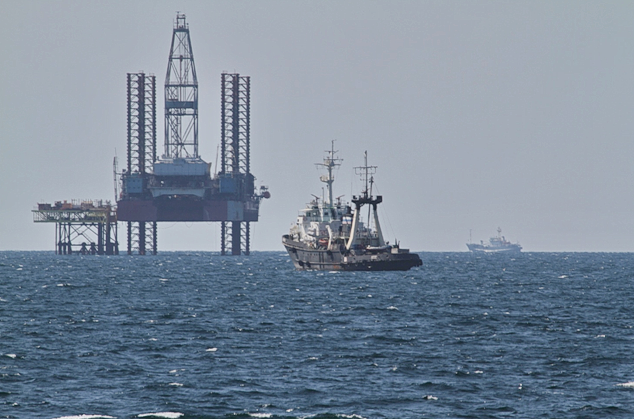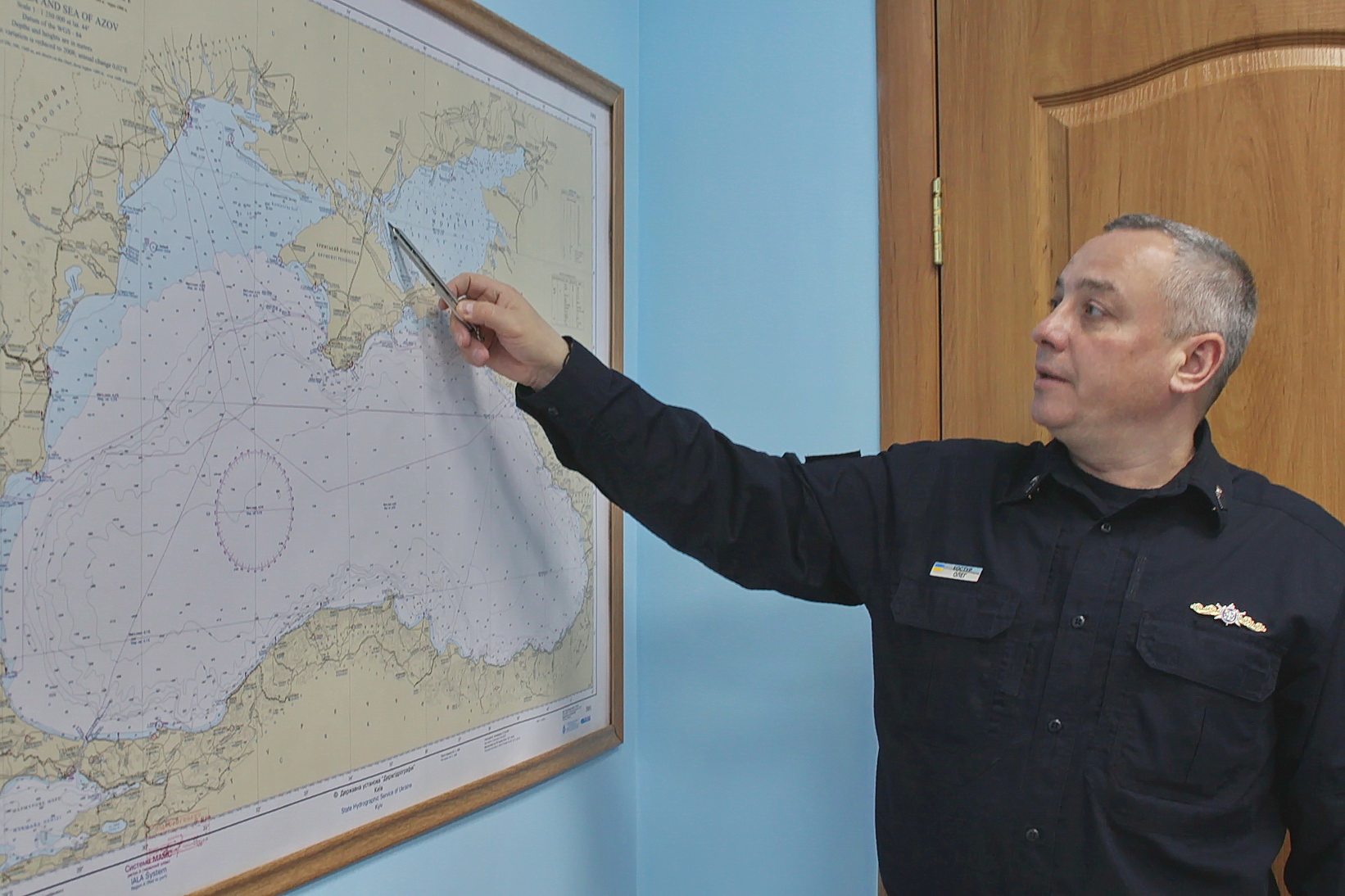ODESA, Ukraine – Russia’s attack on the Ukrainian Navy ships in November may have come as a shock to many, but not for Ukrainian Navy and coast guard officers. To them, the attack fit just right into what Russia has been doing in the Black Sea in the past four years.
Although the Black Sea is international, Russia has been behaving like it has more rights to it than anyone else. Ever since Russia annexed Crimea and orchestrated a war in Ukraine’s east in spring 2014, it has been aggressive towards Ukraine in the Black Sea and the smaller Azov Sea.
It culminated when Russian coast guard ships attacked and captured three Ukrainian Navy vessels and their crews on Nov. 25, triggering martial law in Ukraine and causing condemnation from the West.
Now Ukraine is trying to regroup and rethink how it is protecting itself in the sea.
One of the steps has been the creation of the Coast Guard of the State Border Guard Service of Ukraine, a new agency that took over the defense of Ukraine’s coastline since mid-December.
READ ALSO:
- Russia’s attack in Black Sea, as it happened (EXPLAINER)
- Ukrainian-Russian conflict over Crimea and Azov Sea has long history
- As conflict with Russia escalates, Ukraine finds itself vulnerable at sea
- How much will economy suffer if Azov Sea is lost?
- Sea becomes new front in Russia’s war
Before that, every region had its own department of coast guards but the growing threat from Russia has forced Ukrainian coast guards to reform and consolidate powers.
Rear Admiral Oleh Kostur runs the new agency with the headquarters in Odesa.
“Russia has been trying to change the rules in the sea,” he told the Kyiv Post on Dec. 13.“We stand against the really strong human and military potential.”
The forces are far from equal. Ukraine lost 80 percent of its navy and coast guard fleet when Russia occupied Crimea. Now Ukraine protects itself in the sea with some 70 small motor boats of the coast guard, eight armored motor boats, three warships and 20 non-combatant navy vessels.
By comparison, Russia has more than 10 navy warships and several dozens of motorboats in the Black Sea and some 120 armored boats in the Azov Sea in addition to several dozens of Federal Security Service Coast Guard boats.
To compensate for that inequality, the U.S. and the U.K. deployed their navy vessels to the Black Sea in order to monitor the situation. On Dec. 19, the U.K. warship HMS Echo docked in Odesa.
Russia intends to dominate the Black Sea and in effect is already doing so, according to Glen Grant, a security and defense expert at theKyiv-based think tank Ukrainian Institute.
“Russia is at war with everyone. But other countries are still too frightened or blind to show this openly,” Grant said.
And although the West has finally turned its attention to Russia’s actions in the sea after the Nov. 25 attack, its reaction can’t still be named a strong response.
READ ALSO:
- UK lawmakers conclude visit to Ukraine’s ‘strangled’ Azov Sea
- Foreign policy experts say West still doing too little about Russia’s Azov Sea aggression
- Ex-Putin adviser warns of coming Russian attack on strategic water canal
- Kremlin propaganda stokes anti-Ukrainian hysteria over Kerch incident
- Ukrainian diaspora in US protest against Russia’s Black Sea aggression
“Sooner or later Russia must face militarily response or hit with massive crippling and aggressive sanctions. Otherwise, it will move from the Black Sea to the Mediterranean and continue the aggression.”
Ukrainians say that even with their small fleet, they are better equipped than ever before to face Russia’s aggression.
“Now we know what to expect, and we have become stronger,” Kostur said.
For him and other naval and coast guard officers, Russia’s aggression in the sea has become a reality a long time ago.

Russian navy warships patrol one of the Chornomornaftogas drilling platforms in the Black Sea. Russia seized the Ukrainian drilling platforms in the Black Sea in 2014. (dpsu.gov.ua)
Stealing derricks in 2014
Before the Nov. 25 attack, tensions between Ukraine and Russia in the Black Sea focused mainly on two offshore gas derricks.
When it annexed Crimea in 2014, the Kremlin also seized Ukraine’s two gas derricks in the Black Sea, worth $800 million.
READ ALSO:
- Navy commander offers himself in swap for sailors captured by Russia
- Who are the 24 Ukrainian sailors taken by Russia after sea attack?
The gas drilling platforms are located near Odeske and Holitsianske gas deposits in the Black Sea, some 130 kilometers away from Odesa and 150 kilometers away from the shore of Crimea.
Since then Ukrainian coast guards patrol the sea around the drilling platforms monthly.
Every time they get close to the derricks, they face aggressive reaction, provocations, and threats from Russians guard the derricks day and night.
“They threaten to use weapons against us,” Kostur said. “Their ships conduct dangerous maneuvering close to ours. Their warplanes enter the attack course. During the radio contact, they order us not to come closer than three kilometers to the derricks.”
The derricks belong to the Chernomornaftogas, a branch of the Ukrainian state gas and oil company Naftogaz Ukraine. In 2015, the Russian-backed authorities of Crimea seized, or “nationalized,” Chornomornaftogas.
In September 2017, Naftogaz filed a lawsuit against Russia in The Hague Tribunal demanding $5 billion in compensation for the lost property in Crimea. The verdict is expected to arrive in the first half of 2019.
But the lawsuit hasn’t scared Russia. It has moved the derricks closer to Crimea and since 2016 it has been extracting 1.8 billion cubic meters of gas per year, according to the Ukrainian State Border Guard Service, effectively stealing gas from the area that by international law is an exclusive economic zone of Ukraine.
Russia extracts plenty of gas on its own territory, being the second largest gas producer after the U.S., according to BP’s Statistical Review of World’s Energy 2018. But it needs the derricks to provide gas to Crimea.
The Ukrainian derricks that Russia seized have a scandalous history: they were in the center of one of the most famous corruption scandals in Ukraine’s history.
READ ALSO:
- If Russia wages all-out war, non-NATO member Ukraine is on its own
- Herbst says Russia wants to provoke Ukraine as excuse for more military action
- Ukraine’s allies slam Russia’s attacks on Ukraine off Crimean cost
In 2011-2013,Chornomornaftogaz purchased the two derricks for the artificially high price, allegedly embezzling some $300million.
Yuriy Boyko, now a lawmaker and a presidential candidate in the March 31, 2019 election, back then headed the energy ministry, which Chornomornaftogaz subordinated to. The media linked the corrupt deal to him, but he denied his involvement and was never prosecuted.
In February 2018, Prosecutor General Yuriy Lutsenko named Ukraine’s fugitive President Viktor Yanukovych, his ally Serhiy Arbuzov, and several former Naftogaz officials as the main suspects in the scheme. The investigation is still ongoing.

Rear Admiral Oleh Kostur, the chief of the Ukrainian Coast Guard of the State Border Guard Service of Ukraine shows the areas in the Black and Azov seas where the Ukrainian coast guards usually patrol the coastline at his office in Odesa on Dec. 13. (Veronika Melkozerova)
The changing Black Sea
According to Kostur, while the Azov Sea and Kerch Strait were defined as common territorial waters of Russia and Ukraine by a 2003 agreement, the Black Sea is ruled by the United Nations international maritime law.
It defines a 22-kilometer zone near the shore as a country’s territorial waters and a 370-kilometer zone as that country’s exclusive economic zone.
READ ALSO:
- Martial law legislation comes into effect
- Rada approves shoot-on-sight rules of engagement for Coast Guard
- Martial Confusion
- 10 oblasts adapt to life under martial law
“Our last meeting with Russians in the sea was in September when we were patrolling the southwest part of the Black Sea,” Kostur said.“They asked what we were doing in the sea economic zone of Russia. But the ship commander answered our ship was in Ukrainian waters. Russians had no more questions.”
Kostur said such dangerous trolling has become frequent in the Black Sea. “But you can’t get used to this. Sea is always dangerous and unpredictable. Russians have made it an even bigger threat.”
What Ukraine is doing
Ukraine has been boosting its military strength ever since the Russian invasion in 2014. The government is going to spend some $7.6 billion on defense in 2019. It spent $6.1 billion in 2018, which already was more than 5 percent of the country’s GDP, and $4.9 billion in 2017.
In 2019, Ukrainian navy will get a new rocket complex and a spy ship in addition to several speed motor boats, Ukraine’s Defense Minister Stepan Poltorak said during Dec. 20 visit to Odesa Oblast, Ukrinform news website reported.
Another change is more freedom to act for Ukrainian coast guards.
The Ukrainian parliament on Dec. 6 supported the bill that allowed Ukrainian coast guards to shoot without warning at all ships trying to attack Ukrainian vessels or violate Ukraine’s sea borders.
“There is always not enough money but enough critics who say Ukrainian government is not doing enough to protect the country. But I think the government must set priorities,” Kostur said.“For example, is it better to buy one new ship or the powerful rocket complex that can destroy several ships in the sea from the coast?”
READ ALSO:
